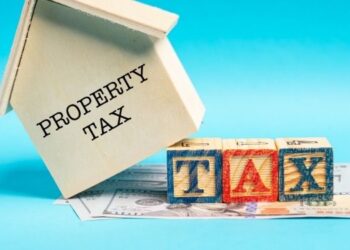It is no surprise that property taxes in Illinois can get extremely complicated, especially here in Chicago and Cook County where they are often a hot topic among political leaders, property owners, and potential real estate buyers and developers. To navigate the complexity, lets break down how the taxes are calculated.
Market Value
X 10%
Assessed Value
X State Equalizer
Equalized Assessed Value
X Local Tax Rate
Tax Before Exemptions
Less: Exemptions
Total Taxes Due
Already confused? Don’t worry, you are not alone! We will dissect each component of this calculation to clear up the confusion.
First, an important item to note is that property taxes in the state of Illinois are paid in arrears. This means that the money that is paid to the county today is for last year’s tax bill. Why are taxes paid in arrears? This dates to the 1930’s during the Great Depression, when legislators made the decision to delay collecting property taxes for a year.
Market Value
So how does the county determine what your property tax will be? It starts with the market value of your home. The market value is the amount of money you would likely receive if you were to sell your property on the market. Every three years, Cook County does an analysis on your property’s market value by evaluating similar properties recently sold in your area. If you live in a very prosperous neighborhood with high property values, you should expect to pay more in taxes.
Assessed Value
Once the market value is determined, the assessor will take 10% of the value and refer to this as the assessed value.
(Note: the examples below illustrate Cook County only. Taxation governance and procedures vary by county. Consult your county for its specific details).
| Market Value | Assessed Value |
| $250,000 | $250,000 x 10% = $25,000 |
Equalized Assessed Value
From there, the state of Illinois will determine a multiplier each year for all counties, referred as the state equalizer. This multiplier is intended to make property tax rates approximately equal across all Illinois counties. The rate announced in June 2019 that impacts 2018 tax bills was 2.9109. Multiplying the assessed value by the state equalizer, will get the equalized assessed value.
| Assessed Value | State Equalizer | Equalized Assessed Value |
| $25,000 | 2.9109 | $25,000 x 2.9109 = $72,773 |
Local Tax Rate
The next calculation in the tax bill is the actual tax rate the county needs in order to collect for services supplied by each municipality. This rate is set by the county clerk after each community has set their budgets. Many services that are paid for from property taxes are schools, pensions, water reclamation, park districts, public safety services, health facilities, mosquito abatement, etc.
| Equalized Assessed Value | Local Tax Rate | Taxes Due Before Exemptions |
| $72,773 | 6.786%* | $72,773 x 6.786% = $4,938 |
*Sample local tax rate
Exemptions
Finally, the county will reduce you taxes by any exemptions for which the property owner qualifies. These are the possible exemptions that owners may be eligible, however, there is a maximum of 4 exemptions per property.
- Homeowners Exemption – Eligible if owners use their property as their primary place of residence. Calculated as $10,000 x local tax rate.
- Senior Citizen Exemption – Eligible if owners are 65 years of age or older and the property is a primary place of residence. Calculated as $8,000 x local tax rate.
- Senior Freeze Exemption – Freezes the equalized assessed value of a property. Eligible if property owners are 65 years of age or older, have a gross household income less than $65,000, and the property is their primary place of residence.
- Home Improvement Exemption – Allows property owners to make up to $75,000 in improvements without increasing the taxable market value for at least 4 years. Eligible property owners must have building permits issued for the improvements.
- Returning Veterans Exemption – Eligible if property owners have served in the U.S. Armed Forces, Illinois National Guard, or U.S. Reserve Forces and are returning from active duty. A $5,000 reduction in the equalized assessed value is given for each year of returning from service.
- Disabled Veterans Homeowner Exemption – Veterans with a service-connected disability are eligible for an exemption based on their percentage of disability.
- Disabled Persons Exemption – Eligible if property owners are disabled and the property has been used as their primary residence. The maximum exemption amount is $2,000.
| Taxes Due Before Exemptions | Exemptions | Total Taxes Due |
| $4,938 | Homeowner: $10,000 x 6.786%* = $678 Senior Citizen: $8,000 x 6.786%* = $543 | $4,938 – $678 – $543 = $3,717 |
*Sample local tax rate
Installments
Your annual taxes payable are split into two installments. The Cook County Treasurer will issue a bill for the first installment in March and the second installment in July. New tax rates are established and put into effect on the second installment payment. Your first installment will be 55% of the prior year’s total tax bill.
Appealing Your Taxes
If you feel that the market value of your property is not reflected accurately within your tax calculation, you may appeal this value for free and potentially save hundreds to thousands. Every 3 years different townships throughout the county will be reassessed. You can find out which townships are currently being reassessed here:
https://www.cookcountyassessor.com/Appeals/Appeal-Deadlines.aspx
Many attorney’s specialize in appealing property taxes and they will take care of all the filing for you. Typically, this service is free, but the attorney will charge you a percentage of the tax savings you receive if your appeal is successful. You may also appeal your taxes yourself. It is best to file an appeal for your taxes within 30 days of receiving a notice in the mail that your property is being reassessed. To learn more about the filling process, visit the Cook County assessor site here:
https://www.cookcountyassessor.com/Appeals/Appeal-Forms.aspx
Real Estate Transfer
Since property taxes are paid in arrears, what happens when you sell your property? Are you still liable to pay for the taxes even though you do not own the parcel any longer? For the answer, I’ll quote one of our founding fathers Benjamin Franklin: “…In this world nothing can be certain, except death and taxes.” In short, yes.
Although real estate taxes in Illinois are paid in arrears, when it comes to a real estate closing, the seller must pay the current year’s taxes immediately at the closing table. This payment does not go directly to the county, instead, it is treated as a credit to the buyer and it transfers the payment obligation to the new owner of the property when the tax bills are sent the following year. The good news is that a seller is not responsible to pay the entire year’s tax bill, sellers are only required to pay a prorated amount based on the number of days they have owned the property in the current year.
The real estate attorneys assisting with the transaction are required to make the tax proration calculation. Since it is impossible to determine the exact tax amount for the current year due to the timing of when the county sets their new budgets, the attorneys will take the prior year’s full tax amount and multiply it by 100-110% (whichever rate was negotiated in the purchase agreement) to calculate an estimate of the taxes due. The 100-110% rates are used since it is assumed property taxes will remain constant or continue to rise the following year.
For more information on property taxes, please visit the following resources:
http://www.cookcountypropertyinfo.com/default.aspx#
https://www.cookcountyassessor.com/Search/Property-Search.aspx
DISCLAIMER
For questions about this article, feel free to reach out to me, but please note this document is for informational purposes only and should not be cited as an official or authoritative source. Contact official documents or legal counsel for further assistance before acting on your particular property tax situation.




